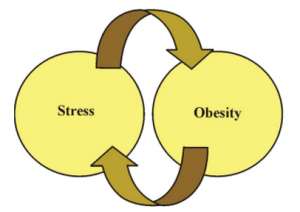Obesity is a rapidly increasing epidemic with important consequences for public health. As I mentioned in my article ‘4 Tips for Feeling Psychologically Ready for Weight Loss Operations!‘, stress and obesity are interrelated, as one increases, the other increases.
While short-term stress can cause a person to lose their appetite, chronic stress can have the opposite effect. Stress, in the short term, causes the brain to produce an appetite-suppressing hormone called corticotrophin-releasing hormone. During times of stress, signals are also sent to the adrenal glands that trigger their production of adrenalin, which temporarily suppresses any urge to eat as part of the fight-or-flight response. Ongoing stress, on the other hand, causes the release of a hormone called cortisol. This hormone increases a person’s appetite and, if the stress does not pass, cortisol and appetite levels remain increased.

It has long been theorized that an association exists between long-term stress and obesity. Chronic stress can lead to “comfort eating,” which often involves the overeating of foods that are high in fat, sugar, and calories, which, in turn, can lead to weight gain However, studies have shown that obese individuals have high rates of depression, anxiety, and personality disorders. Many animal studies have suggested that stress affects food choices, with subjects preferring foods rich in fat and sugar when they are physically or emotionally stressed. These foods seem to inhibit brain activity involved in processing stress and anxiety, which has the effect of countering these emotions.
In addition to overeating, stress can also lead to sleep problems, decreased motivation to exercise, and increased alcohol consumption, all factors that increase the likelihood of weight gain.


Is obesity a mental health problem?
Obesity is not a mental health problem, but mental health problems can cause obesity because they affect a person's eating habits.
What is a mental health problem caused by obesity?
Mental health problems caused by obesity can be listed as depression, anxiety disorder and depression.
Does stress cause obesity?
Stress can cause obesity. As a result of chronic stress, a person may turn to eating to relax. If this becomes a recurring situation, the person will start to gain weight and after a while he/she will not be able to control his/her weight.
Who is more prone to obesity?
Obesity is generally more common in women than in men. Weight gain is also seen with increasing age.
Do nerves and stress cause weight gain?
Anger and stress can cause obesity as they affect a person's eating habits.








